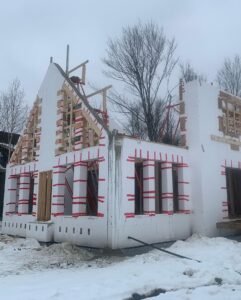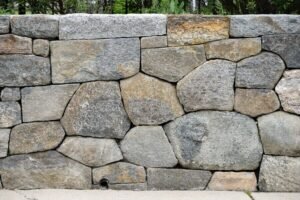When it comes to building or renovating a home, choosing the right exterior material is one of the most important decisions you’ll make. Brick, stone veneer, and solid masonry are all popular options, but they have different costs, benefits, and aesthetic appeal. Understanding the differences helps homeowners, builders, and investors make informed choices for long-term value.
Whether you’re a homeowner, contractor, real estate investor, or builder, understanding these materials helps you choose the right option for your budget and design goals.
At TheFixitGuys , our team handles masonry work , demolition, construction cleanup, and full property preparation, so we see firsthand how these materials perform in real-world conditions. This guide breaks everything down in clear, human-friendly language.
Table of Contents
ToggleWhat Is Masonry And Why Does It Matter?
Masonry refers to building walls or structures using materials like brick, stone veneer, or solid masonry units. It’s one of the oldest construction methods in the world because it is:
- durable
- weather-resistant
- fire-resistant
- long-lasting
- visually appealing
Not all masonry is the same, and choosing the right material can affect your home’s appearance, strength, maintenance, and overall cost
1. Brick Masonry
Brick ranks among Canada’s most trusted building materials, seen everywhere from red chimneys to sturdy garden walls. People love it for how tough it is, how easily it shrugs off rain and sun, and the kind of classic look that never fades.
What Brick Is Made From
Most bricks are made from fired clay, shale, or concrete. They can be:
- structural (load-bearing)
- decorative (non-load bearing, used as siding or veneer)
Benefits of Brick Masonry
1. Strong and Long-Lasting
Brick can last over 50–100+ years with proper care. They resist pests, fire, and severe weather.
2. Low Maintenance
Brick walls hardly ever need fixing—maybe just a quick patch when a corner chips. Now and then, a bit of fresh mortar keeps the walls solid and their lines crisp.
3. Natural Insulation
Brick doesn’t just look good—it helps regulate indoor temperature.
4. Classic and Versatile Aesthetic
Brick styles vary from rustic red to sleek modern tones. It works for:
- homes
- commercial buildings
- fireplaces
- accent walls
5. Environmentally Friendly
Clay is natural, and many brick manufacturing processes use recycled materials.
Drawbacks of Brick Masonry
- It costs more than vinyl siding or basic cladding,
- feels heavier so the structure needs solid support,
- takes time and effort to install, and while you can paint it,
- changing the color isn’t always easy.
Average cost in Canada: $25 – $50 per square foot (materials + installation)
Costs vary depending on the brick style, colours, labour, and structure size.
If heavy debris or demolition is needed before brick installation, services like debris removal or site prep may also be required.
2. Stone Veneer
Stone veneer is one of the most popular alternatives to natural stone. It offers the look of real stone at a fraction of the price and weight.
You’ll find two main types:
- Manufactured stone veneer (made from concrete or aggregates)
- Natural thin stone veneer (real stone cut thin)
Benefits of Stone Veneer
1. Affordable Alternative to Real Stone
Stone veneer is cheaper than solid natural stone, making it ideal for exterior facades, fireplaces, and accent walls.
2. Lightweight and Easy to Install
Compared to real stone, veneer is easier to install and doesn’t need reinforced foundations.
3. Huge Variety of Styles
Stone veneer comes in many colours, textures, and styles, from slate and granite to fieldstone and river rock.
4. Low Maintenance
Veneer requires little upkeep—no sealing or painting in most cases.
Drawbacks of Stone Veneer
- It’s less durable than real stone and can crack if it’s installed carelessly;
- it’s mostly decorative,
- not structural, and without good water barriers,
- moisture can seep in and cause trouble.
Cost of Stone Veneer
Average cost in Canada:
$15 – $35 per square foot (materials + installation)
Manufactured stone is more affordable than natural thin veneer.
3. Solid Masonry (Full-Thickness Stone or Brick)
Solid masonry uses thick stone or brick walls—real weight that holds the building up, not just a pretty surface.
This type of masonry is the most traditional and long‑lasting, though it’s also the priciest—think of thick stone walls that keep their shape for generations.
Benefits of Solid Masonry
1. Unmatched Strength
Full-thickness stone or brick can last over 100–150 years. Many historic buildings are still thriving because of solid masonry.
2.Extreme Durability
Solid masonry:
- doesn’t rot
- resists extreme temperatures
- is fireproof
- stands against high winds
- maintains long-term structural integrity
3. True Natural Beauty
Natural stone masonry is considered one of the most beautiful and premium exterior finishes.
Drawbacks of Solid Masonry
- Most expensive option by far
- Requires highly skilled labour
- Heavy and needs strong foundation support
- Slower installation
- Repairs can be costly
Because of its complexity, solid masonry is more common in high-end homes, commercial buildings, and architectural features.
Cost of Solid Masonry
Average cost in Canada:
$40 – $100+ per square foot (depending on stone type and installation complexity)
If an old wall needs to be removed before rebuilding, contractors often require demolition services to safely take down the existing structure.
Comparison Table — Brick vs Stone Veneer vs Solid Masonry
| Feature | Brick | Stone Veneer | Solid Masonry |
| Cost | $$ | $–$$ | $$$$ |
| Durability | High | Medium | Very High |
| Weight | Heavy | Light | Very Heavy |
| Installation Time | Moderate–Long | Short | Long |
| Aesthetic Range | Medium | Very High | High |
| Maintenance | Low | Low–Medium | Very Low |
| Fire Resistance | High | Medium–High | Very High |
| Structural Support Needed | Yes | Minimal | Yes |
| Best For | Homes, exteriors | Accent walls, fireplaces, facades | High-end homes, commercial buildings |
Which Option Should You Choose?
Choosing masonry material depends on your:
- budget
- aesthetic preference
- structural requirements
- desired durability
- long-term maintenance goals
Here’s a simple breakdown to help:
Choose Brick If…
- You want a timeless look
- Need strong durability
- Want low maintenance
- Your budget is mid-range
- You want good fire and weather resistance
Brick is a great fit for homes, garages, fireplaces, and commercial structures.
Choose Stone Veneer If…
- You want the look of real stone without paying a fortune,
- need no heavy structural blocks,
- prefer something light to handle,
- You enjoy variety in textures and colours
This option is excellent for interior feature walls, exterior accents, and fireplaces.
Choose Solid Masonry If…
- You want unmatched durability
- You’re building a premium or luxury structure
- You’re willing to invest more for long-term value
- You want a natural stone appearance with structural benefits
Solid masonry is often used in high-end homes, retaining walls, and heritage-style buildings.
Environmental Impact: Which Option Is Better?
Brick
Natural clay, recyclable, energy-intensive to fire.
Stone Veneer
- Manufactured veneer uses cement and pigments
- Natural thin veneer requires less quarrying
Solid Masonry
- Natural stone requires significant quarrying
- Long lifespan reduces long-term environmental impact
Maintenance Requirements
Brick
- Occasional repointing (replacing mortar)
- Minimal cleaning
- Highly weather-resistant
Stone Veneer
- Check for moisture issues
- Occasional sealing (optional)
- Clean with mild detergent
Solid Masonry
- Very low maintenance
- Repairs rarely needed
- Extremely resistant to cracking
Installation Considerations
Regardless of the material you choose, installation quality matters more than anything else.
A poorly installed veneer or brick wall won’t last—even if the material is premium.
Professional installers should:
- build proper drainage planes
- apply correct mortar mixtures
- ensure correct structural support
- follow local building codes
- implement water-resistant barriers
For Ontario-specific guidelines, refer to Ontario Building Code — ontario/ building-code
FAQs
Q1: Which is more expensive — brick, stone veneer, or solid masonry?
- Solid masonry is the most expensive, followed by brick. Stone veneer is the most affordable.
Q2: Can stone veneer be used structurally?
- No, stone veneer is decorative and not load-bearing.
Q3: Which material requires the least maintenance?
- Solid masonry and brick require minimal maintenance; stone veneer needs occasional moisture checks.
Q4: How long does each material last?
- Brick: 50–100+ years
- Stone veneer: 20–50 years
- Solid masonry: 100+ years
Q5: Can I install brick or stone veneer over existing walls?
- Yes, but you may need site preparation, including debris removal or minor demolition.
Q6: Which option improves home resale value most?
- Solid masonry provides the highest resale value, followed by brick. Stone veneer offers good curb appeal at a lower cost.
Conclusion
Choosing between brick, stone veneer, and solid masonry comes down to your budget, design goals, and long-term plans.
- Brick offers classic beauty, durability, and low maintenance.
- Stone veneer provides a flexible, affordable way to get a luxurious stone look.
- Solid masonry gives unmatched strength, longevity, and premium appeal.
For any project, proper site preparation, grading, and demolition are crucial to ensure a safe and long-lasting build. Thefixitguys can assist with:
- Demolition services
- Debris removal
- Site grading and preparation
- Residential and commercial construction prep
Selecting the right masonry material ensures your home or building looks great, stands the test of time, and adds value for years to come.















